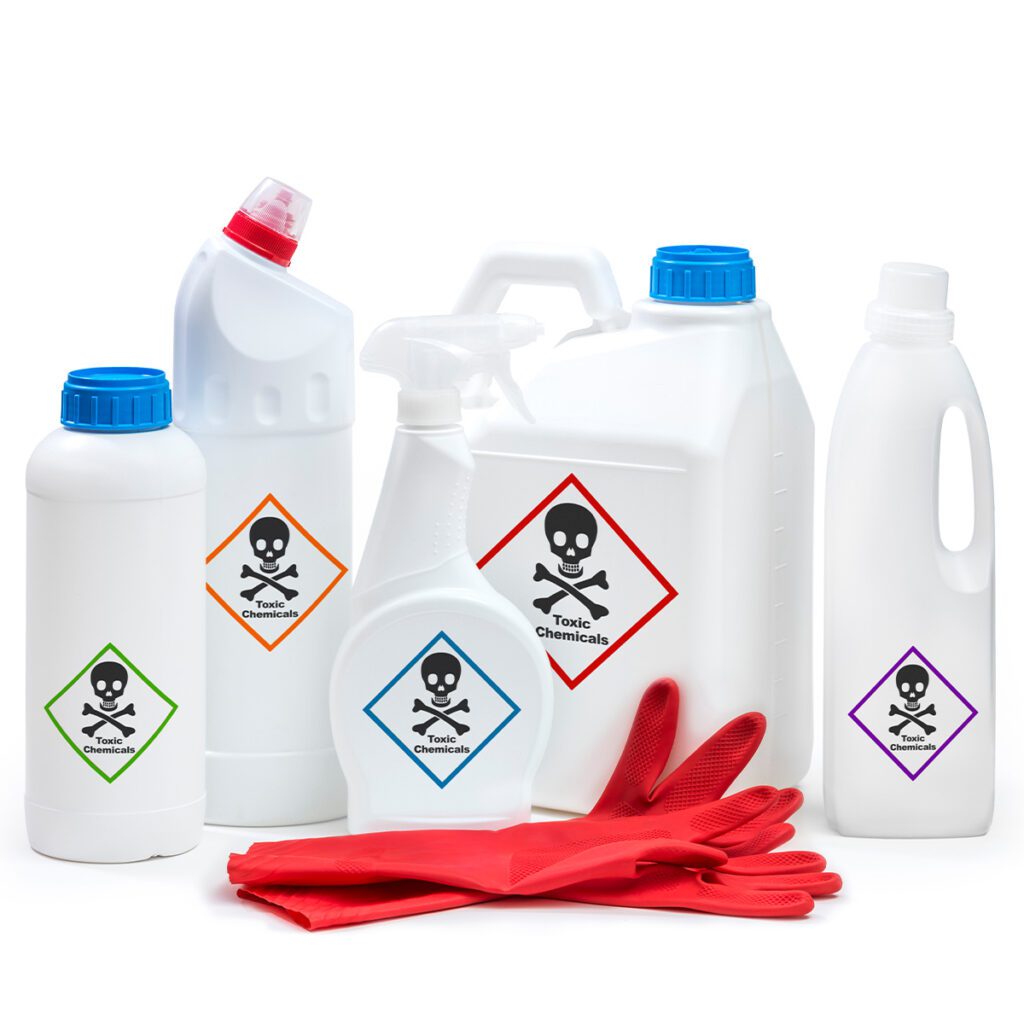Around the House
In a society of modern convenience, the easiest thing to do with a household item that is past its prime, such as a half empty can of old paint or a used fluorescent light bulb, is simply to toss it in the trash. However, just as each of these was purchased at a price, their disposal comes at a price as well.
For many, the environmental consequence may be only a distant or passing thought. Nevertheless, many everyday household items may well present a hazard to the environment if disposed of improperly. Surprisingly, American families generate 1.6 million tons of household hazardous waste each year.
The average home may accumulate as much as 100 pounds of household hazardous waste in its basement, garage and other storage areas. It is further estimated that individuals may generate up to four pounds of such waste annually.
Household hazardous waste is not regulated by law at the federal and state levels as are other hazardous substances. Improper disposal of such waste simply compounds the situation. Flushing down the toilet, washing down the drain, or just throwing certain items into the regular trash for weekly pickup may actually be detrimental to the environment and to the public health.

What is hazardous waste?
Household hazardous waste is generally classified into six categories:
- Lawn and Garden Care: weed killers and pesticides, herbicides, fungicides, chemicals used to treat lawns
- Personal Care and Pharmaceuticals: prescription drugs, nail polish and remover, hair color solution, mercury thermometers
- Hobby products: glues, stains, paints, contact cement, finishes, photographic chemicals
- Auto maintenance: gasoline, motor oil, brake fluid, batteries, solvents, antifreeze, car wax
- Cleaning products: cleaners for floors, ovens, toilets, drains and bathrooms; aerosol cans, furniture polish, chlorine bleach
These are just a few examples of household hazardous waste. Ammunition, radioactive elements in smoke detectors, and electronic items require special consideration as well. Old appliances such as microwave ovens and refrigerators may contain lubricants, Freon gas, or other harmful substances.
The U.S. Environmental Protection Agency has established a general hierarchy of waste disposal which is applicable to household hazardous waste as well. Preferred methods of control and disposal include reducing waste wherever possible, reusing items as often as is practical, recycling eligible items and finally, proper disposal when required.
During the last 25 years, more than 3,000 communities across the country have developed programs to facilitate the disposal of household hazardous waste containing corrosive, toxic, flammable or poisonous components. Certain pickup or drop-off options are available, and when individuals are in doubt, local agencies are often available to answer questions concerning proper disposal.
How does proper disposal benefit my community?
The benefits of the proper disposal of household hazardous waste are numerous, including the prevention of pollution which could harm both people and the environment, cost savings through the reuse of certain household products, and the conserveation of energy that would otherwise be expended to produce more of the products.
Individual households can make a difference by consciously purchasing environmentally friendly products, reducing the purchases of necessary items containing hazardous materials, and monitoring the storage, use and disposal of hazardous products. For example, hazardous products should be kept in their original containers with the labels intact – never stored in food containers or containers not designed for corrosive or flammable materials.
Instructions for proper use and disposal are often printed on labels. Read these thoroughly and follow them. Unpleasant chemical reactions could occur if potentially hazardous household products were stored with other products.
Families may wish to conduct an inventory of potentially hazardous materials currently in their homes, ensure that these are stored safely, and then develop a plan for the future use and disposal of these items.
Some communities have established permanent collection sites, designated specific days for the collection of household hazardous waste, and enlisted the aid of certain local businesses in the proper disposal of household hazardous waste. Community activism could include a service station or automotive facility accepting used motor oil from an individual who changes the oil in his car himself. Otherwise, more used oil might simply be poured out on the ground and seep into the water table.
What does the Chattanooga area offer?
In Chattanooga, an efficient and effective recycling and disposal program has been in operation for some time. As for household hazardous waste, residents of the city and Hamilton County can call 311 with any questions.
The Wood Recycling Facility accepts household hazardous waste at no charge. Materials such as automotive fluids, motor oil, fire extinguishers, propane bottles and tanks, computers, dry cell batteries, fungicides, pesticides, insecticides, herbicides, adhesives, paint supplies, starter fluids, air conditioning refrigerants, grease and rust solvents, cleaners, and drain opening compounds are accepted. However, materials which are unidentifiable or radioactive will not be taken. Ammunition, explosives, wood, brush, and medical or commercial hazardous waste are prohibited.
Several convenience centers are also available to dispose of some potentially hazardous materials from the home. These include the Warner Park Recycle Center, the John A. Patten Recreation Center, and sites at Access Road at DuPont Parkway, the East Brainerd baseball complex and 5955 Brainerd Road. These centers accept any recyclable which is eligible for curbside pickup along with shredded paper, glass bottles, wet and dry cell batteries, used motor oil, and unbroken tubular and compact fluorescent light bulbs. Any computer monitor disposal must be made at the Orange Grove Industrial Training Center.
Soddy-Daisy offers recycling at the Sequoia Recycling Center. Dalton, Ga. offers a facility called Self Recycling, Inc. Cleveland facilities can be located at the Bradley County Landfill, Urbane Road and Peerless Road.
The proper disposal of household hazardous waste prevents the prolonged low-level exposure to toxic chemicals and contributes to the sustainability of the planet as a whole. Recycling, reusing and properly disposing of such waste may require a bit of additional effort; however, it is without a doubt the right thing to do.




